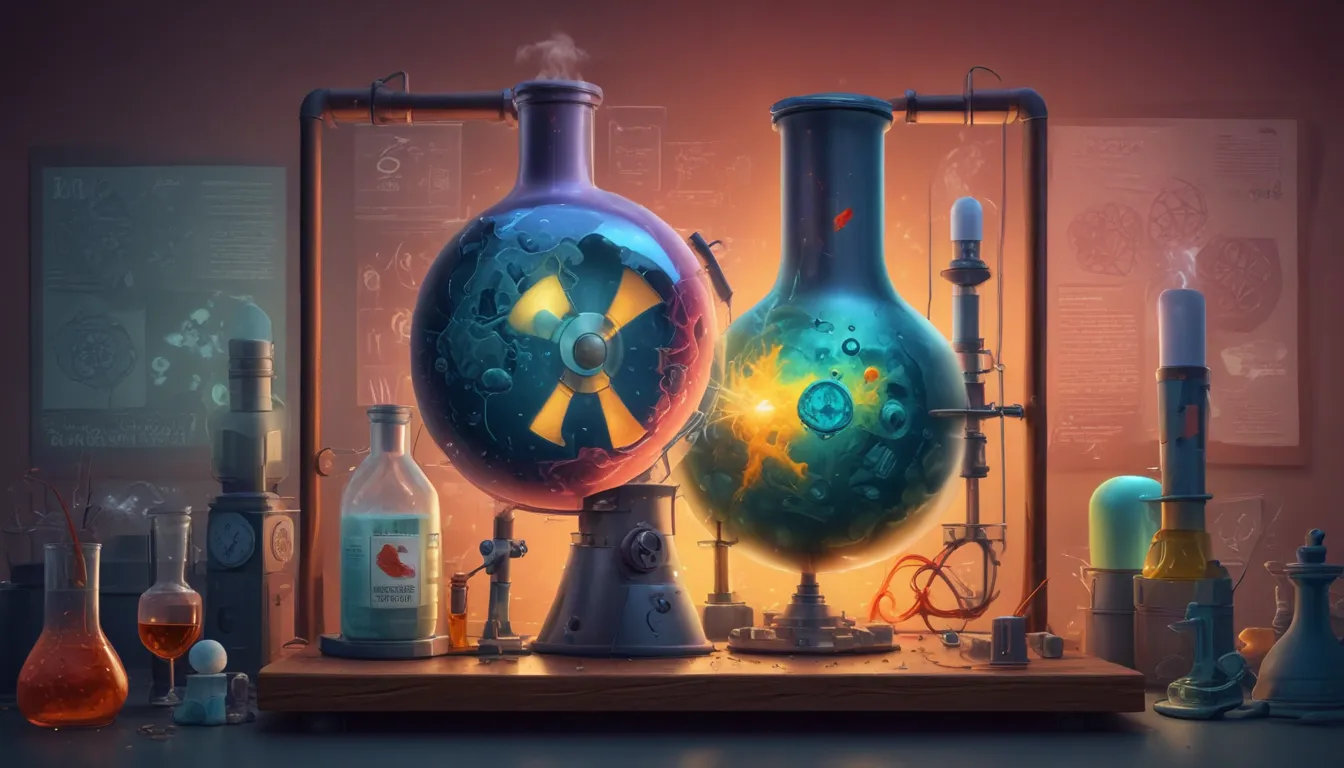A Note About Images: The images used in our articles are for illustration purposes only and may not exactly match the content. They are meant to engage readers, but the text should be relied upon for accurate information.
Have you ever wondered about the incredible world of nuclear chemistry and its role in shaping our lives? Nuclear chemistry is a captivating branch of science that delves into the properties and behavior of atomic nuclei, leading to groundbreaking discoveries like nuclear fission and fusion. In this article, we will uncover 19 unbelievable facts that will leave you in awe, from the discovery of isotopes to the impact of nuclear energy on sustainability and space exploration. Whether you’re a science enthusiast or simply curious about the mysteries of atoms, get ready for an enlightening journey through the realm of nuclear chemistry.
Nuclear Chemistry Unveiled: Key Takeaways
- Nuclear chemistry has revolutionized various fields, from energy generation to medicine and even space exploration.
- Understanding nuclear chemistry is essential for addressing global challenges such as sustainable energy, medical advancements, and space exploration.
The Fascination of Nuclear Fission
In 1938, German chemists Otto Hahn and Fritz Strassmann achieved a monumental milestone by splitting the nucleus of a uranium atom, a process known as nuclear fission. This groundbreaking discovery laid the foundation for the development of nuclear power and atomic bombs.
Radioactive Decay: Nature’s Balancing Act
Radioactive decay is a natural process in which unstable atomic nuclei emit radiation to achieve a more stable state. This phenomenon is crucial in nuclear chemistry, enabling scientists to study the properties and behavior of different elements with precision.
Unlocking the Mystery of Isotopes and Half-Life
Isotopes are variants of elements with the same number of protons but differing numbers of neutrons in their nucleus. The half-life of an isotope indicates the time it takes for half of a sample to decay, a vital concept in radioactive dating and medical imaging applications.
Illuminating Insights into Nuclear Reactors
Nuclear reactors harness the power of controlled fission reactions to generate electricity. By converting heat produced from these reactions into steam to drive turbines, nuclear reactors play a significant role in meeting global energy demands with efficiency and reliability.
Journey into the Manhattan Project
During World War II, the United States initiated the highly secretive Manhattan Project with the aim of developing an atomic bomb. This collaborative effort brought together leading minds in nuclear chemistry and physics to unlock the destructive potential of atomic weapons.
Embracing the Power of Nuclear Fusion
Nuclear fusion is a process where two atomic nuclei merge to form a heavier nucleus, releasing immense energy in the process. Scientists are actively exploring fusion as a clean, virtually limitless energy source inspired by the sun’s fusion reactions.
Peer into the Past with Radioactive Dating
Nuclear chemistry plays a pivotal role in determining the age of ancient artifacts and fossils through radioactive dating. By measuring isotopic decay rates in these objects, scientists can accurately estimate their age with remarkable precision.
Pioneering Progress in Medical Applications
Nuclear chemistry revolutionizes the field of medicine with applications like PET and SPECT imaging techniques for disease diagnosis and monitoring. Radioactive isotopes are also utilized in radiation therapy to target and eradicate cancer cells, offering promising treatment options.
Reflections on the Chernobyl Disaster
The tragic Chernobyl nuclear power plant accident in 1986 underscored the importance of stringent safety measures in nuclear operations. This catastrophic event prompted significant advancements in reactor design and operation to enhance safety and prevent future disasters.
Decoding the Periodic Table’s Secrets
The periodic table serves as a foundational tool in nuclear chemistry, organizing elements based on atomic numbers, electron configurations, and chemical properties. This comprehensive framework aids in understanding the behavior and interactions of atoms at a molecular level.
Transforming Elements: The Power of Transmutation
Nuclear chemistry enables the transmutation of one element into another through particle bombardment of atomic nuclei. This transformative process has expanded our knowledge of matter’s building blocks, unveiling new elements and fostering scientific discovery.
Safeguarding the Future: Nuclear Waste Disposal
Effectively managing and disposing of nuclear waste is a crucial focus in nuclear chemistry to minimize environmental and human health risks. Scientists are diligently researching secure storage methods to mitigate the long-term impact of radioactive waste.
Unraveling the Legacy of Nuclear Weapons
Nuclear chemistry played a pivotal role in the development of atomic weapons, ushering in a new era of geopolitical tensions and global efforts towards nuclear disarmament. The immense destructive power of these weapons highlights the need for responsible nuclear policies.
Illuminating Insights with Neutron Activation Analysis
Neutron activation analysis is a valuable technique in nuclear chemistry to analyze material compositions effectively. By exposing samples to neutron bombardment, scientists can identify element concentrations through analysis of resulting gamma radiation.
Powering Progress: Nuclear Energy and Sustainability
Nuclear energy emerges as a cornerstone in achieving sustainable, carbon-neutral power sources. With its ability to generate vast energy without emitting greenhouse gases, nuclear power offers a compelling solution in combating climate change and promoting energy sustainability.
Delving into Uranium Enrichment
Uranium enrichment is a critical step in obtaining nuclear reactor fuel or developing nuclear weapons. This process involves elevating Uranium-235 concentrations to sustain chain reactions within nuclear systems, highlighting its significance in nuclear technology.
Insights from Nuclear Magnetic Resonance (NMR)
Nuclear magnetic resonance serves as a powerful analytical tool in chemical research, offering valuable insights into molecular structures and dynamics. By studying atomic nuclei behavior in a magnetic field, NMR enables researchers to unravel complex chemical compositions.
Navigating the Realm of Nuclear Winter
Beyond immediate devastation, nuclear detonations can trigger catastrophic consequences like nuclear winter, characterized by prolonged darkness and plummeting temperatures caused by atmospheric debris and soot. This chilling phenomenon underscores the enduring impact of nuclear conflicts.
Embracing Nuclear Chemistry’s Cosmic Role
Nuclear chemistry extends its reach beyond Earth, contributing to understanding celestial bodies’ compositions. By analyzing isotopic ratios in meteorites and moon rocks, scientists gain valuable insights into the solar system’s formation and evolution.
Unveil the Wonders of Nuclear Chemistry: A Gateway to Discovery
From unraveling the mysteries of nuclear fission to exploring the potential of nuclear fusion as a clean energy source, the realm of nuclear chemistry captivates with its transformative impact on society. These 19 remarkable facts offer a glimpse into the intricate world of atomic nuclei, demonstrating the profound implications of nuclear chemistry in shaping our present and future.
As we delve deeper into the nucleus’s secrets and harness the energy from nuclear reactions, we embark on a journey of scientific exploration and technological advancement. The vast potential of nuclear chemistry continues to push boundaries, offering innovative solutions in energy production, medical advancements, and beyond.
FAQs: Unveiling the Intriguing World of Nuclear Chemistry
-
What is nuclear chemistry?
Nuclear chemistry entails the study of atomic nuclei properties, reactions, and transformations, elucidating the underlying principles governing atomic interactions. -
How does nuclear chemistry contribute to energy production?
Nuclear chemistry fuels energy production through controlled nuclear reactions in reactors, generating heat to produce electricity efficiently and sustainably. -
Is nuclear chemistry safe in practical applications?
When handled with strict safety protocols and regulations, nuclear chemistry and technologies maintain a high level of safety standards to safeguard workers and the environment effectively. -
What role does nuclear chemistry play in medicine?
Nuclear chemistry revolutionizes medical applications with diagnostic imaging techniques like PET scans and radioisotope-based cancer treatments, enhancing disease diagnosis and therapy options. -
How do nuclear reactions differ from chemical reactions?
Nuclear reactions involve alterations in atomic nucleus composition, resulting in significant energy release, while chemical reactions pertain to electron interactions leading to atomic rearrangements. -
Can nuclear chemistry advance space exploration?
Yes, nuclear chemistry contributes to space exploration through technologies like RTGs, utilizing radioisotope decay heat to power spacecraft during extended missions beyond Earth. -
How has nuclear chemistry impacted society at large?
Nuclear chemistry’s profound impact resonates across various societal realms, from sustainable energy provision to medical advancements, scientific discoveries, and geopolitical transformations.
Embark on a Journey of Scientific Discovery with Nuclear Chemistry
The captivating realm of nuclear chemistry unveils a spectrum of awe-inspiring facts, encompassing diverse applications and groundbreaking discoveries that shape our world. Explore the wonders of nuclear fission, fusion, isotopes, and beyond, as you immerse yourself in the transformative power of atomic nuclei. Embrace the essence of nuclear chemistry as a gateway to innovation, sustainability, and enlightenment in the ever-evolving landscape of science and technology.






